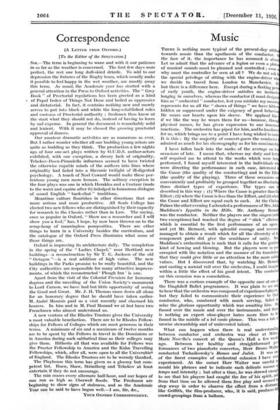Correspondence
(A LETTER FROM OXFORD.) [To the Editor of the SPECTATOR.]
Ssa,—The term is beginning to wane and with it our patience in so far as the weather is concerned. The first few days were perfect, the rest one long dull-skied drizzle. To add to our depression the fixtures of the Rugby team, which usually make it possible to feel happy in the wet weather, are mostly away this term. As usual, the Academic year has started with a general attention in the Press to Oxford activities. The " Grey Book " of Proctorial regulations has been greeted as a kind • of Papal Index of Things Not Done and hailed as oppressive and dictatorial. In fact, it contains nothing new and merely serves to put into black and white the long-established rules and customs of Proctorial authority ; freshmen thus know at the start what they should not do, instead of having to learn by sad expense. In general the document is remarkably mild and lenient. With it may be classed the growing proctorial approval of dances.
Our amateur dramatic activities are as numerous as ever, But I rather wonder whether all our budding young actors are quite as budding as they think. The production a few nights ago of four one-act plays written by O.U.D.S. author-actors exhibited, with one exception, a dreary lack of originality. Tchekov-Ibsen-Pirandello influences seemed to have twisted the otherwise capable minds of the authors into lines where originality had faded into a Slavonic twilight of ill-digested psychology. A touch of Noel Coward would make these por- tentous young men more human. The solitary exception in the four plays was one in which Heraldes and a Centaur (nude to the waist and equine after it) indulged in humorous dialogue of sound English " back-chat " traditions.
Meantime culture flourishes in other directions that are more serious and more productive. All Souls College has elected two new fellows who are distinguished by their capacity for research in the Classics rather than in Law. The saying, once so popular in Oxford, " Show me a researcher and I will show you a fool," has, I hope, by now been thrown on to the scrap-heap of meaningless pomposities. There are other things to learn in a University besides the curriculum, and the catalogue of the Oxford Press illustrates what some of those things are.
Oxford is improving its architecture daily. The completion
in the spring of the " Ladies Chapel," near Hertford new buildings—a reconstruction by Sir T. G. Jackson of the old " Octagon "—is a real addition of high value. The new buildings in the Parks promise to be really beautiful, and the City authorities are responsible for many attractive improve- ments, of which the reconstructed ' Plough Inn ' is one.
Apart from the visit of the Colonial Premiers for honorary degrees and the unveiling of the Union Society's monument to Lord Curzon, we have had but little opportunity of seeing the Good and Great. Mr. J. H. Thomas came down all alone for an honorary degree that he should have taken earlier. M. Andre Maurois paid us a visit recently and charmed his hearers. In him and in M. Paul Morand we at last have two Frenchmen who almost understand us.
A new venture of the Rhodes Trustees gives the University a most valuable benefaction. There are to be Rhodes Fellow- ships for Fellows of Colleges which are most generous in their terms. A minimum of six and a maximum of twelve months are to be spent by the Fellows in travel in the Dominions or in America during such sabbatical time as their colleges may give them. Hitherto all that was available for Fellows was the Proctor Fellowship to America and the Kahn Travelling Fellowships, which, after all, were open to all the Universities of England. The Rhodes Trustees are to be warmly thanked.
The Playhouse this term has given us a gloomy but com- petent list. Ibsen, Shaw, Strindberg and Tchekov at least entertain if they do not encourage.
The rain ceases every alternate half-hour, and our hopes of sun run as high as Cherwell floods. The Freshmen are beginning to show signs of staleness, and so the Academic Year can be said to have begun well.—I am, Sir, &c., Yours OXFORD CORRESPONDENT.














































 Previous page
Previous page